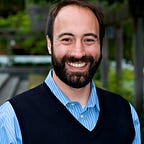Law in a Time of Cholera
Long before the current crisis, we conferred upon our federal and especially state governments the authority to isolate us, restrict our travel, and limit our ability to gather. These powers exist and they are significant. But they are not limitless. The very real authority to address a pandemic is accompanied by equally real statutory and constitutional safeguards every American should know about.
We are living in unique and challenging times. Whether we are living in unprecedented times depends on what you count as precedent. Each era of human history has seen one or more significant outbreaks of disease that have collectively killed many millions of human beings. In the past twenty years alone, the world has had to contend with HIV, SARS, MERS, Swine flu, and Ebola, among other dangerous viruses. Within the past century, the Flu of 1918 killed nearly 200,000 Americans in a single year.
This long-standing danger of deadly, communicable disease means that governments already have protocols in place for addressing pandemics. In our system, the primary authority for containing disease resides in the states. As a recent post in Lawfare describes, most every state possesses authority to isolate infected people and quarantine those who may have been exposed.
In Washington State — an early epicenter of the present COVID-19 outbreak in the U.S. and home to my university — public health officials are required to document their attempts to secure voluntary quarantine. Then, if the officials have enough “reason to believe” that a non-compliant individual poses a serious or imminent risk to the health and safety of others, they can impose quarantine by force. Violations of quarantine orders by the individual or anyone else constitute a criminal misdemeanor.
In addition to the statutory authority conferred upon public health officials, the Governor of Washington has broad emergency powers. It is worth looking at the statute (RCW 43.06.220) in full; the emergency powers include everything from imposing a curfew to prohibiting crowds from gathering in public.
The federal government, too, claims the power to quarantine. The Surgeon General, working with the Center for Disease Control, may apprehend and detain people for the purposes of examination and to prevent the spread of sufficiently serious diseases in U.S. territories and across borders. The President must sign an executive order designating a virus as eligible for quarantine. It turns out that an 2014 order from President Obama aimed at previous coronavirus outbreaks already designates all deadly respiratory disease as eligible, which presumably includes COVID-19 without amendment.
These powers to combat the spread of disease are significant. But they are not limitless. In Washington, for example, public health authorities cannot impose quarantine for longer than 10 days without seeking a court order. Since the recommended quarantine for COVID-19 is 14 days, presumably every instance of involuntary quarantine would have to involve the courts. Washington law requires that officials use the least restrictive means of containment, provide the quarantined with basic necessities and medical care, and inform the individual of their right to counsel and appeal. The law even affords a right to refuse medical treatment during quarantine on religious grounds. Emergency orders by the Governor suspending Washington law, meanwhile, must be ratified by the legislature within 30 days.
The U.S. Constitution imposes limits on federal and state actors alike. Americans are entitled to due process under the law, which includes the ability to challenge detention. In 1905, the Supreme Court upheld the authority of the Massachusetts health authorities to impose mandatory smallpox vaccines. But involuntary quarantine is a different matter, perhaps analogous to civil confinement requiring clear and convincing evidence of serious danger. In general the right to travel is a “liberty” subject to due process, and of course the First Amendment specifically guarantees “the right of the people peaceably to assemble.”
Some questions are genuinely difficult. Governor Inslee of Washington has invoked his emergency powers to prohibit social gatherings larger than 250 people. The Governor’s political rival recently called for such an assembly. Could the Governor be permitted to sanction participants for attending? For that matter, would the President be able to shut down a large protest over his handling of the outbreak?
These unique times may yield new precedents, legal and otherwise. Yet two things are important to bear in mind. The first is that elected lawmakers anticipated the need for governments to respond to crises like COVID-19 and conferred the powers necessary to do so. And second, lawmakers and courts have also anticipated the potential for abuse. Few doubt COVID-19 constitutes a crisis worthy of government response. But to paraphrase Justice Robert H. Jackson in another context, emergency powers have a tendency to kindle emergencies.
The advice we keep hearing is neither to panic over the new coronavirus nor to treat it as anything but serious. Similarly, you should not doubt the power of the government to respond in an emergency like this epidemic, nor fail to expect safeguards and limits.
Thank you to Hugh Spitzer, Jevin West, and Carl Bergstrom for their thoughtful edits and the University of Washington Gallagher Law Library for timely research. For more on the rule of law during a public health crisis, watch for an online course at Northwestern Law led by Daniel Rodriguez also tentatively entitled “Law in a Time of Cholera.” The reference is of course to Love in the Time of Cholera by Gabriel Garcia Marquez.
